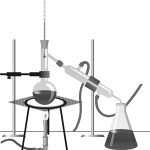Today's post is adapted from Dr. Hans-Hermann Thulke of the University of Gottingen study published in The American Naturalist
Plants are able to make complex decisions and assess risks and adopt strategies based on the circumstances to maximize chances of producing offspring.
The study focused on the European Barberry (Berberis vulgaris) plants and a specialized species of the Tephritid fruit fly. Adult Tephritids are a parasite who will lay their eggs in the fruit of the Barberry plant and the larvae will feed on the seeds as they are born.
The Barberry plant has evolved a defense, which botanists call "selective seed abortion". Most Barberry fruits contain two seeds, and the evolutionary behavior allows for the plant to shutdown development of the infected seed, essentially killing the parasite. By not aborting the seed, when the larvae grows, it would end up eating the other seed, so aborting one protects the other from being eaten.
Further research of the berries did show some interesting behavior, there are instances where the plant does not always abort the seed. If the fruit only contains a single seed, it rarely would abort it. So the plant is investing energy to breed future generations of parasites, a seemingly irrational choice.
Thulke feels that this is a sensible strategy, "If the Barberry aborts a fruit with only one infested seed, then the entire fruit would be lost. Instead it appears to 'speculate' that the larva could die naturally, which is a possibility. Slight chances are better than none at all," he says.
5% of single seed, infected fruits are aborted, compared to 75% where the fruit contains two seeds. The study also showed that abortion rates were also higher when resources were limited (e.g. water). If both seeds in a plant were infected, rates for aborting the second seed mirrored that of single seeded fruits. The scientists looked at plants in the same family that had not developed similar defenses against the parasite. "This anticipative behaviour, whereby anticipated losses and outer conditions are weighed up, very much surprised us. The message of our study is therefore that plant intelligence is entering the realms of ecological possibility," says Thulke.
As the paper notes, "Behavior is traditionally attributed to animals only. Recently, evidence for plant behavior is accumulating, mostly from plant physiological studies ... Ecological evidence for complex decision making in plants thus includes a structural memory (the second seed), simple reasoning (integration of inner and outer conditions), conditional behavior (abortion), and anticipation of future risks (seed predation)."
Next thing you know, your garden salad is going to start evolving.
References:
- Thulke, Hans-Hermann "Adaptive and selective seed abortion reveals complex conditional decision making in plants" American Naturalist March 2014
